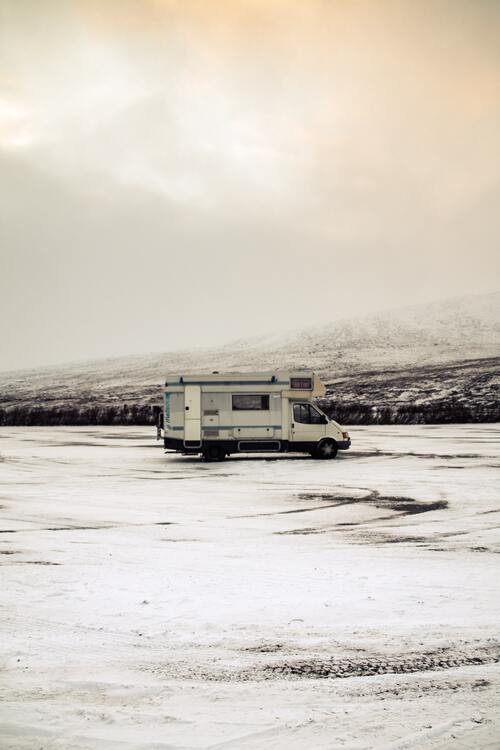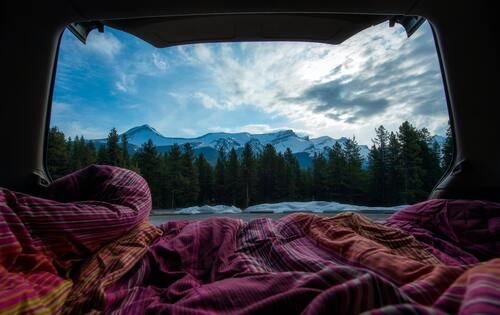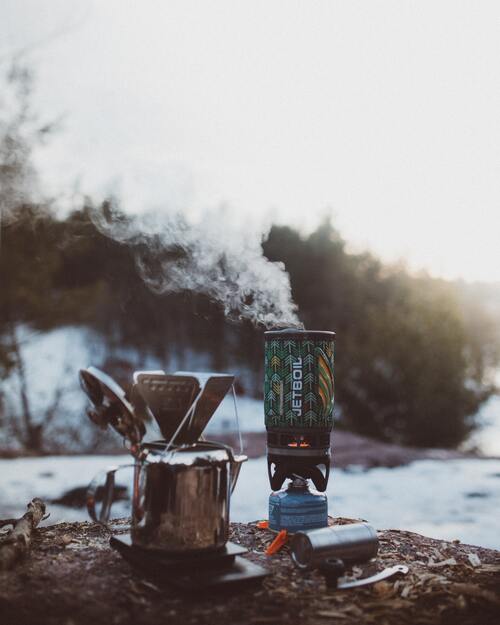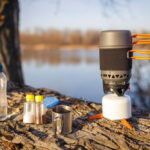RV camping is enjoyable, especially when you do it in winter. Nothing is better than riding to a remote campsite only to enjoy the silence and calm of winter, surrounded by nothing but white horizons. Sound great, does it not?!
As incredible as it may sound, camping during the winter can be difficult as it is. Add an RV to the equation, and you will have many more things to consider. For one, you will need to learn how to keep RV pipes from freezing while camping in winter.
If this topic interests you, but you have no prior knowledge of it, you have come to the right place. Please read this guide to learn about RV winter camping trips and how to make them fun and convenient. Let’s get right into it!
More...

Table of Contents
Why Does It Matter If The Pipes Freeze?
There is one simple reason why you need to keep your RV pipes from freezing during winter camping. If they freeze, all water tanks and lines in your RV will become unusable and might even suffer serious damage.
This is not a problem if you are camping near a stream or a fountain you can use to get drinking water. If no clean and usable water is near you, you might risk dehydration and other problems from having no water to drink.
If there is one thing you need on camping trips, it is water. So, it would be best to have your RV water lines and water tanks stay warm and usable at all times. Even when winter camping, there are several things you can do to keep the RV and all water in it from freezing. You can learn more about that in one of the following sections, so make sure to read up!
What Happens If RV Pipes Freeze?
Suppose you decide to take a camping trip in cold temperatures. In that case, you need to be prepared for your RV pipes to freeze. RV owners know how important it is to keep RV pipes from freezing since the ice can cause damage to the RV’s water system, including all black and gray water tank pipes.
The damage I mentioned comes from the ice that often forces pipes to expand. Under pressure from the ice, the pipes are likely to burst. That will make them completely unusable, which is never a good thing.
Instead of leaving yourself without usable water, you should prevent the pipes from freezing. You can also try to defrost them if you suspect some parts are frozen.
Here is how you can do that:
Step 1: Locate the frozen area in your RV’s water pipes and lines.
Step 2: Heat the frozen area using heating pads or heated blankets.
Step 3: Consider applying heat tape if you have any to protect the pipes from future extremely cold temperatures.
Step 4: Start running the water once the pipe starts warming up. Drop by drop, the water will start moving through the entire water and plumbing system. The constant water movement will prevent the water system from freezing.
Even though it is relatively easy to defrost frozen RV water pipes, it is better to prevent freezing instead of dealing with it afterward. That way, you do not risk damaging the pipes and get to keep them pristine.

At What Temperatures Will Pipes Freeze In The Winter?
Temperatures below 20 degrees Fahrenheit are unsuitable for camping with exposed RV pipes. Suppose water stays exposed to such freezing temperatures for about six hours. In that case, it will freeze in the pipes and even lead to expansion and bursting.
When camping in winter, you must do your best to prevent frozen RV pipes. This means using RV skirting, an RV furnace or heater, any heating pad or tape – whatever comes in handy to keep the pipes warm.
Keep in mind that temperature drops are only one of the things that can cause the pipes to freeze. For example, leaving the RV exposed to cold air, at higher altitudes, with little to no protection from the sides, can also cause frozen pipes. So, you must be careful at all times – not only when the temperatures drop to 20 degrees.
At What Temperature Will Pipes Freeze Without Heat?
Comparable to what would happen during a winter camping trip, RV pipes can freeze if you leave them exposed to cold weather and temperatures below 20 degrees Fahrenheit. Anything around and below 20 degrees is too cold for your RV’s pipes, so you will need to be careful.
Again, other things can also affect the state of the pipes – air temperature, wind speed and direction, altitudes, and so on. If you suspect your RV’s pipes could freeze, consider applying heat or keeping them more protected. An extra layer of insulation will be quite handy, but installing it in freezing temperatures will not be that pleasant.
How To Prevent Frozen Pipes While Camping? [Tips For Unfreezing Pipes]
Still, trying to figure out how to keep RV pipes from freezing while camping? Do not worry – I have a few helpful tips you can try out.
Remember that it is always better to check the forecast before your trip and do your best to protect the pipes before you go out in the cold. That way, you will prevent damage to the pipes and save yourself a lot of work and effort.
Here are some of the things you should try doing to prevent frozen water pipes:
Anti-freeze
If you are a driver, you will know how helpful antifreeze can be during winter. Adding antifreeze to your pipes to prevent them from freezing is smart.
To apply RV antifreeze, you must empty all water tanks and lines while closing the valves. Add approximately half of the antifreeze to the pipes and let it sit for a while. As the pipes start opening up, you can add more antifreeze.
Thanks to the antifreeze, your pipes should get back in top shape within minutes. Please ensure you add antifreeze to each line or risk some of them damaging over time.
Heating blanket
Heating blankets are a wise investment to keep things from freezing and keep yourself warm. When camping below-freezing temperatures, you can use your heated blanket on pipes or a freshwater tank to prevent freezing.
All you need to do is plug the blanket in power socked and let it warm up. Then, wrap it around or place it near something you need to keep warm. Keep it in that position until the ice melts or the entire trip if you suspect the pipes may freeze again.
Heat tape
The heat tape is like a heat cable you plug in to get a bit of warmth. The negative aspect of it is that you need electricity to run it. Otherwise, it is effortless to use since you only need to wrap it around or leave it near whatever it is you want to warm up.
You can use the heat tape around a pipe, a water heater, or any tank you want to keep from freezing. It will keep things from freezing while also making your RV warm.
Propane heater
Using a space heater is also smart since many people use space heaters to keep themselves warm on winter trips. Propane heaters are great because they run on propane gas instead of electricity. This means you can use them even on remote campsites that do not offer electricity.
When temperatures dip, turn on the heater and put it near the pipes. Keep an eye on it constantly because the gas can cause some issues. Also, make sure to allow constant ventilation near the heater.
Extra insulation
While you can always use the heat tape as extra insulation, adding an actual insulation layer is also smart. To do this, you will need to put in some effort before heading on the trip.
To prevent freezing, you can use insulating foam or high R-value insulation all over the lines. You can also use it on the underbelly, where the RV’s pipes are located.
Running water
Allowing constant water movement in your pipes will prevent them from freezing. So, keep the water running at all times, leaving drop by drop to pass through the system.
Winterize RV
By winterizing your RV, I mean applying insulation around windows and doors, adding an RV skirting, using non-toxic anti-freeze on your pipes, and other things that protect your RV during winter. That way, the warm air will stay inside the RV and keep the lines warm.
Empty water system
There are more convenient options than this when you need to use the RV, but you can try it out when it is out of use. Empty all holding tanks, tank heaters, and pipes. Then, there will be no water in the pipes to freeze.

Wrap-Up
Thank you for reading this guide on how to keep RV pipes from freezing while camping. I hope you learned a lot of valuable information you would use whenever camping in cold weather.
Remember that you must protect your RV plumbing and pipes at all times, so ensure that you insulate them before the weather takes a turn for the worse.
Let me know which unfreezing or insulation method you like best and have found to work well. I cannot wait to read all your comments!
- Are Merrell Shoes Good? – An Unbiased Review of Merrell Footwear - December 9, 2023
- Where Are Merrell Shoes Made? - December 9, 2023
- Camping in 40-degree Weather: Tips and Tricks - September 25, 2023

![How to Protect Yourself While Camping? [TOP Camping Safety Tips] How to Protect Yourself While Camping? [TOP Camping Safety Tips]](https://grandcircletrails.com/wp-content/uploads/2022/07/How-to-Protect-Yourself-While-Camping-1-150x150.jpg)



![How to Make Toast While Camping? [Methods You Need To Try] How to Make Toast While Camping? [Methods You Need To Try]](https://grandcircletrails.com/wp-content/uploads/2022/07/How-to-Make-Toast-While-Camping-150x150.jpg)
